OMA’s office furniture for UniFor is colourful and modular
A new collaboration between OMA and UniFor on the Axel Springer Berlin Campus has evolved into a fully fledged office furniture collection, to be unveiled during Milan Design Week 2022
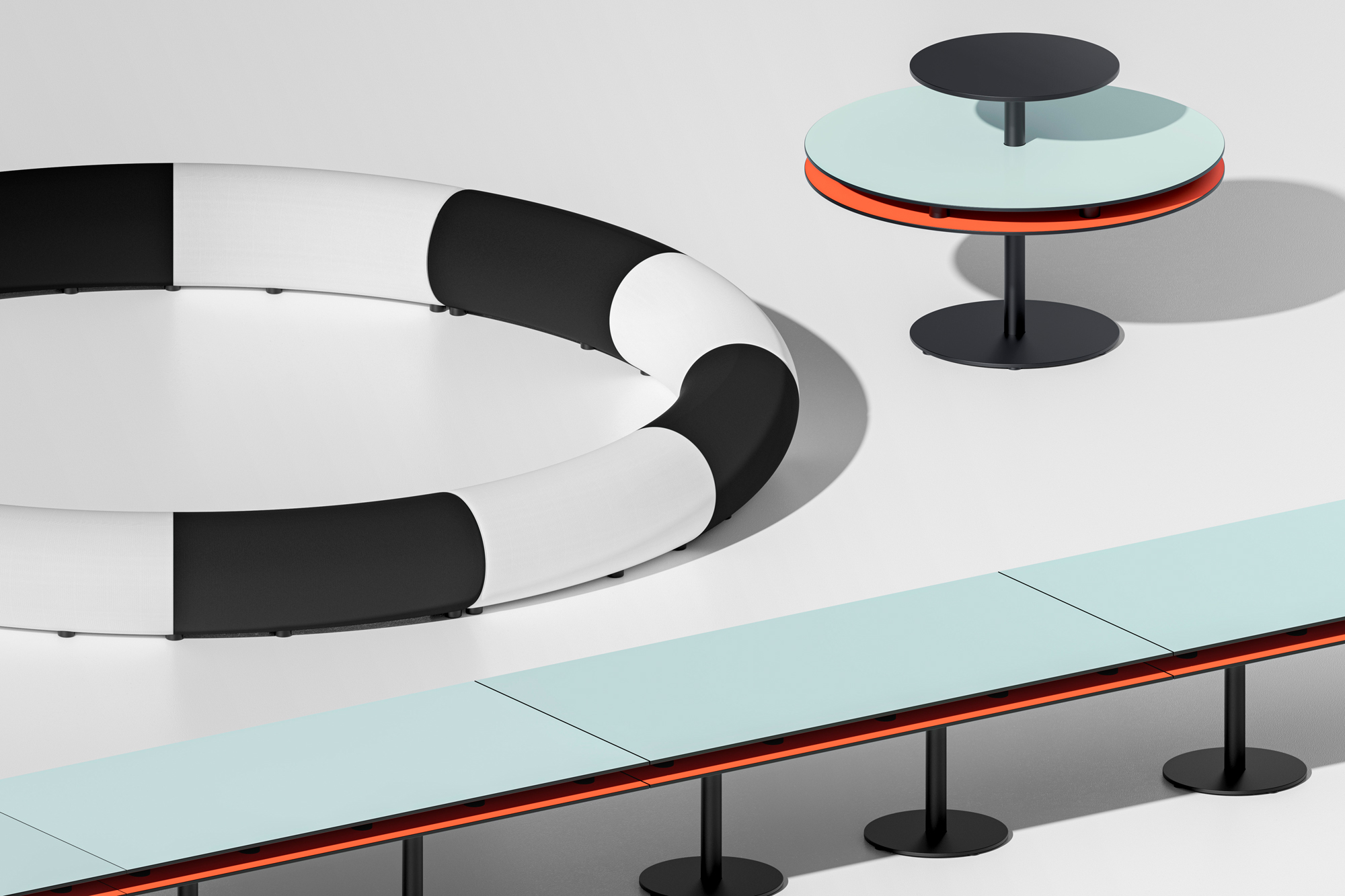
Studio Amos Fricke - Photography
In 2014, German publishing behemoth Axel Springer selected OMA to design its new Berlin HQ, with a view to creating working environments that ‘support the cultural transformation towards a digital publishing house’. The custom furnishings for the project, produced by Italian office furniture specialist UniFor (part of Molteni Group), have now been expanded into a fully fledged furniture collection, to be unveiled at Milan Design Week 2022.
A new collection of radical office furniture
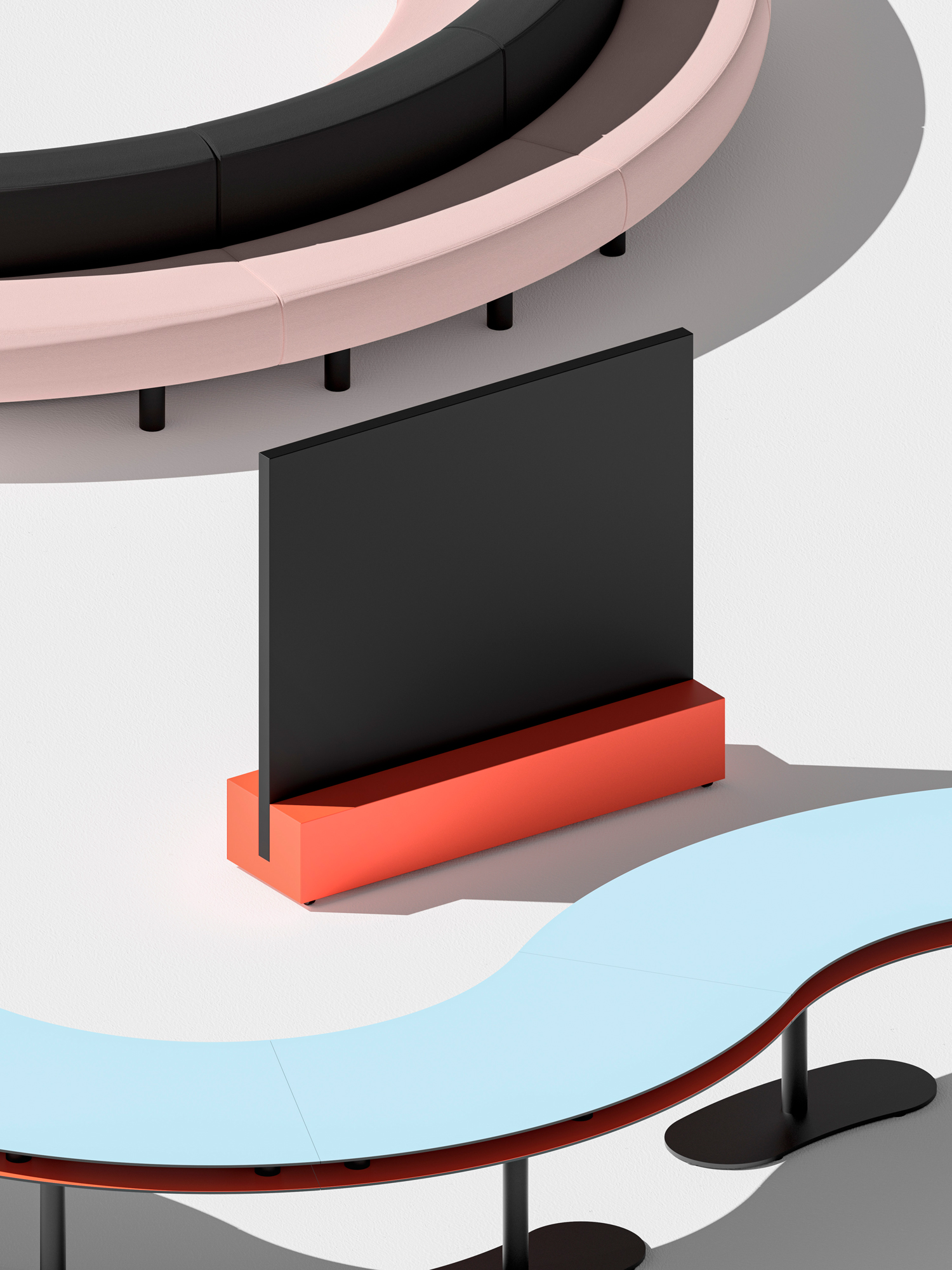
The collection includes curved benches and tables as well as partition screens
‘Axel Springer wanted a radical reinvention of the office, a place to lure the digital bohemia of Europe,’ says OMA associate Philippe Braun, who worked closely with product designer Antonio Barone on the project’s interiors. They considered new methods of collaborative work, taking into account different team sizes and uses of space, and devised a multilevel open-plan set-up, with dynamic clusters of desks and breakout areas with partitions, sofas and workstations.
‘We wanted to avoid the trap of “the cool office”, widely promoted by American tech companies in Silicon Valley and beyond,’ explains Braun. ‘It was important that we inject a good dose of seriousness throughout the collection, avoiding the whimsical and focusing only on the essential.’
It is not unusual for UniFor to take custom-made furniture as a starting point for a collection. ‘Close collaboration with the best international architecture studios, in this case OMA, is a distinctive trait of UniFor’s modus operandi: our products’ genesis is almost always linked to specific design and planning requirements,’ says UniFor Managing Director, Carlo Molteni. ‘We realised that the elements designed by OMA represented a new way to experience the office space: no longer a place for individual work, but increasingly somewhere for socialisation. The unique nature of the pieces convinced us that the collection could be translated beyond a single architectural project.’
OMA and UniFor: a decade of collaboration
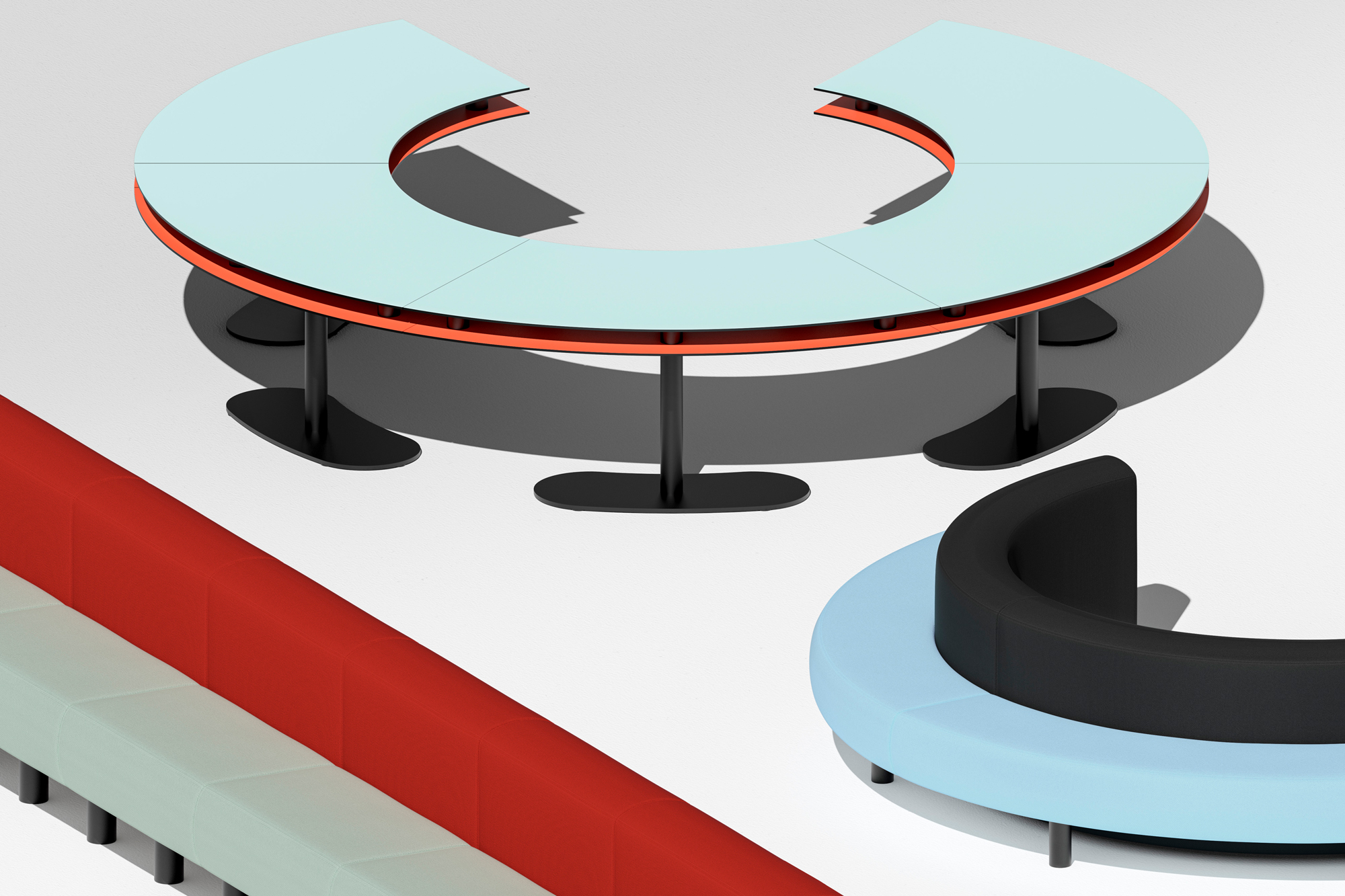
The furniture series features pastel shades, as well as high-visibility orange accents combined with metal and black
OMA and UniFor began their collaboration over a decade ago, when the Rotterdam studio enlisted the company to create the marble bookcases of the Qatar National Library. In 2014, as curator of the Venice Architecture Biennale, OMA co-founder Rem Koolhaas invited UniFor to come on board as one of the technical sponsors. From there, OMA and UniFor have continued to work together on projects of various scales; the Principles collection is their latest collaboration.
‘The experiment that started with the Axel Springer Campus generated successful new ways of interacting within the office and is now available for a broader audience,’ says Koolhaas. ‘We are curious to see how the modules of the Principles collection will come together and serve different work environments globally.’
The collection is an evolution of OMA’s work on the more informal areas of the Axel Springer Campus. It consists of over 100 elements divided by size and typology, which lend themselves to many configurations. Among the key pieces, explains Barone, are the ‘Tables’, ranging in size from 0.1 to six sq m and defined by a double-deck tabletop.
Wallpaper* Newsletter
Receive our daily digest of inspiration, escapism and design stories from around the world direct to your inbox.
We wanted to avoid the trap of “the cool office”, widely promoted by American tech companies in Silicon Valley and beyond
Philippe Braun, OMA associate
‘Other key elements are the “Spines”, an infrastructure characterised by linear and curvilinear footprints, which can generate partitions and pods at different heights, and with different degrees of privacy,’ he continues. The ‘Spines’ are part of a system onto which shelves, desks and sofas can be attached. Further pieces include informal seats, soft islands and screens, with different accessories that can be added onto each piece. ‘Through the combination and re-combination of the different families, the collection caters towards any need of the modern office and working environment.’
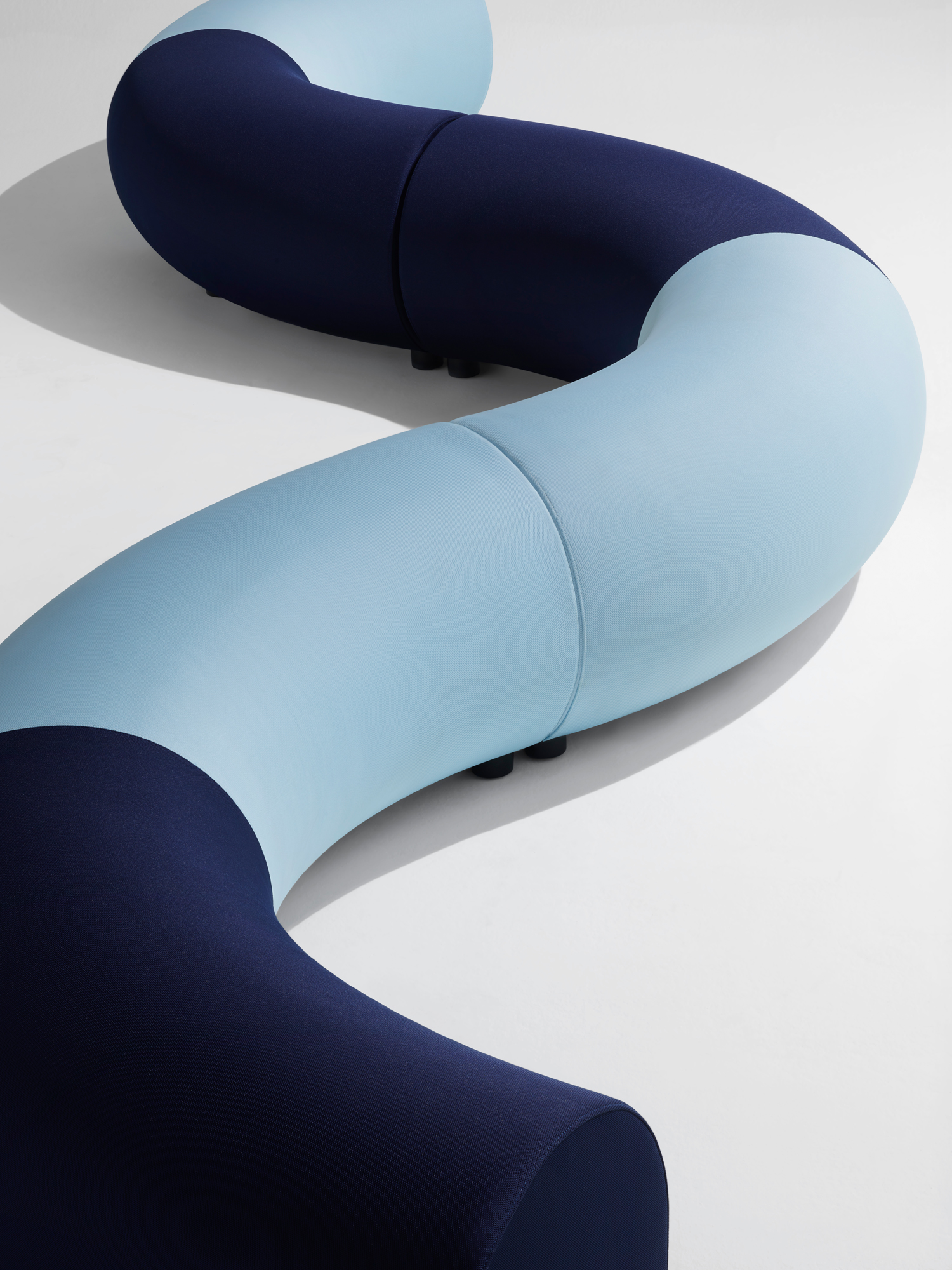
The collection’s informal seating comprises curved modular elements upholstered in high-tech sportswear fabrics
Materials include high-pressure laminates, perforated metal, and high-tech sportswear fabrics. ‘We found these materials to be the solution that best translated the original idea of scalability, flexibility, and virtually endless customisation in the most rational and sensible way,’ says Barone. ‘The collection is first and foremost about space: the simple, at times playful, personality of the pieces makes them a versatile tool of interaction between user, furniture and space.’
Another thing that is obvious (and slightly surprising) when looking at the Axel Springer project is the bold use of colour, which was developed further for the Principles collection. ‘We felt the need to add a degree of freshness and playfulness to the usually neutral uniformity of workplace furnishings, without falling into the trap of corporate branding,’ explains Barone. The studied palette gives users the ability to customise and define the work environment.’
The future of work was a constant topic of discussion throughout the collection’s development. ‘Both UniFor and OMA saw the immense potential of this collection to support the changing nature of the workplace,’ says Braun. ‘But also to take it beyond the office into the public realm, which is increasingly becoming a place for work, gathering and exchange in the same [way] as the office itself.’
INFORMATION
The Principles collection will be shown at Fuorisalone, 6 – 12 June 2022
unifor.it
oma.com
A version of this article appears in the June 2022 issue of Wallpaper*. Subscribe today!
ADDRESS
UniFor Showroom
5 Viale Pasubio
Milan
Rosa Bertoli was born in Udine, Italy, and now lives in London. Since 2014, she has been the Design Editor of Wallpaper*, where she oversees design content for the print and online editions, as well as special editorial projects. Through her role at Wallpaper*, she has written extensively about all areas of design. Rosa has been speaker and moderator for various design talks and conferences including London Craft Week, Maison & Objet, The Italian Cultural Institute (London), Clippings, Zaha Hadid Design, Kartell and Frieze Art Fair. Rosa has been on judging panels for the Chart Architecture Award, the Dutch Design Awards and the DesignGuild Marks. She has written for numerous English and Italian language publications, and worked as a content and communication consultant for fashion and design brands.
-
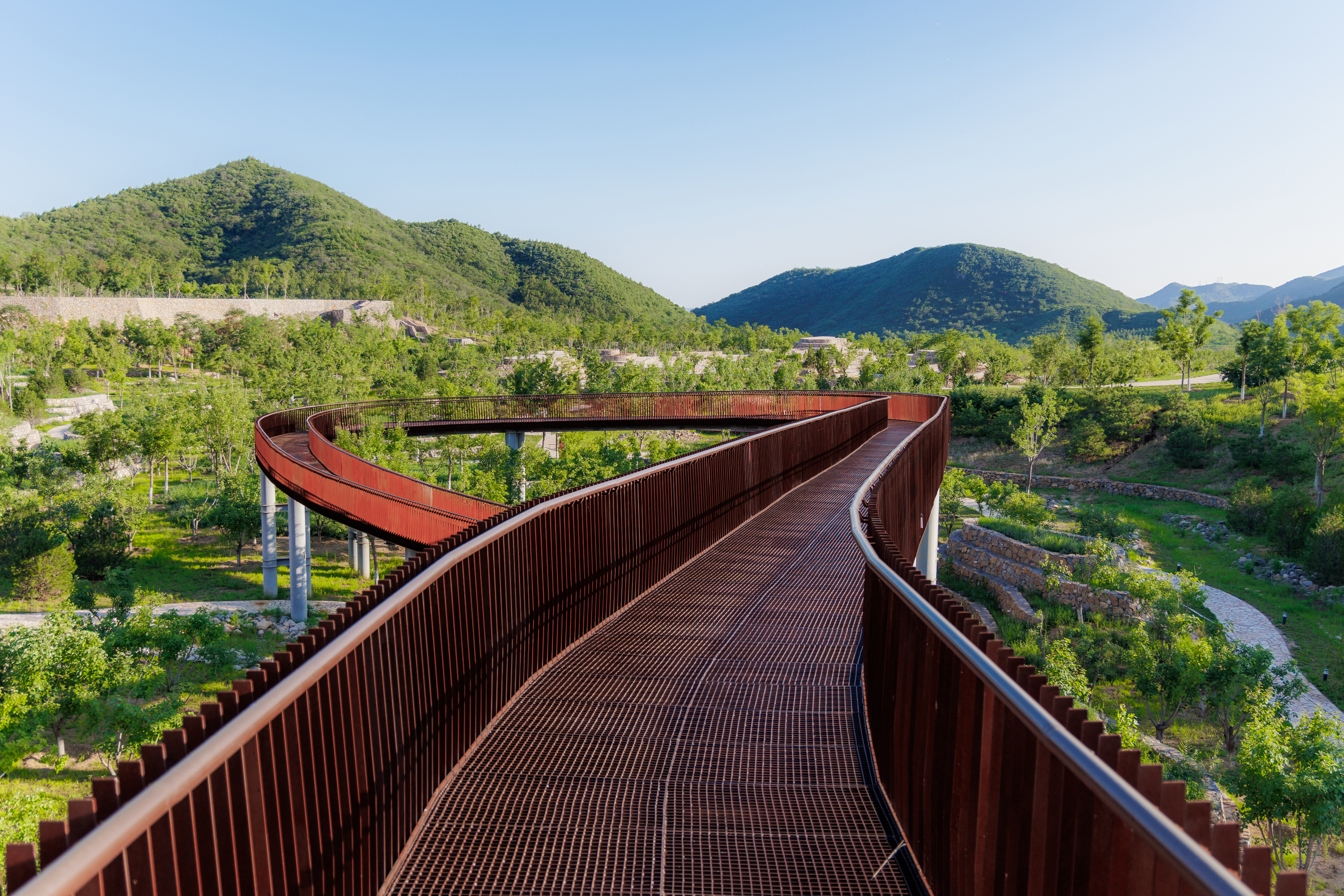 A Xingfa cement factory’s reimagining breathes new life into an abandoned industrial site
A Xingfa cement factory’s reimagining breathes new life into an abandoned industrial siteWe tour the Xingfa cement factory in China, where a redesign by landscape specialist SWA Group completely transforms an old industrial site into a lush park
By Daven Wu
-
 Put these emerging artists on your radar
Put these emerging artists on your radarThis crop of six new talents is poised to shake up the art world. Get to know them now
By Tianna Williams
-
 Dining at Pyrá feels like a Mediterranean kiss on both cheeks
Dining at Pyrá feels like a Mediterranean kiss on both cheeksDesigned by House of Dré, this Lonsdale Road addition dishes up an enticing fusion of Greek and Spanish cooking
By Sofia de la Cruz